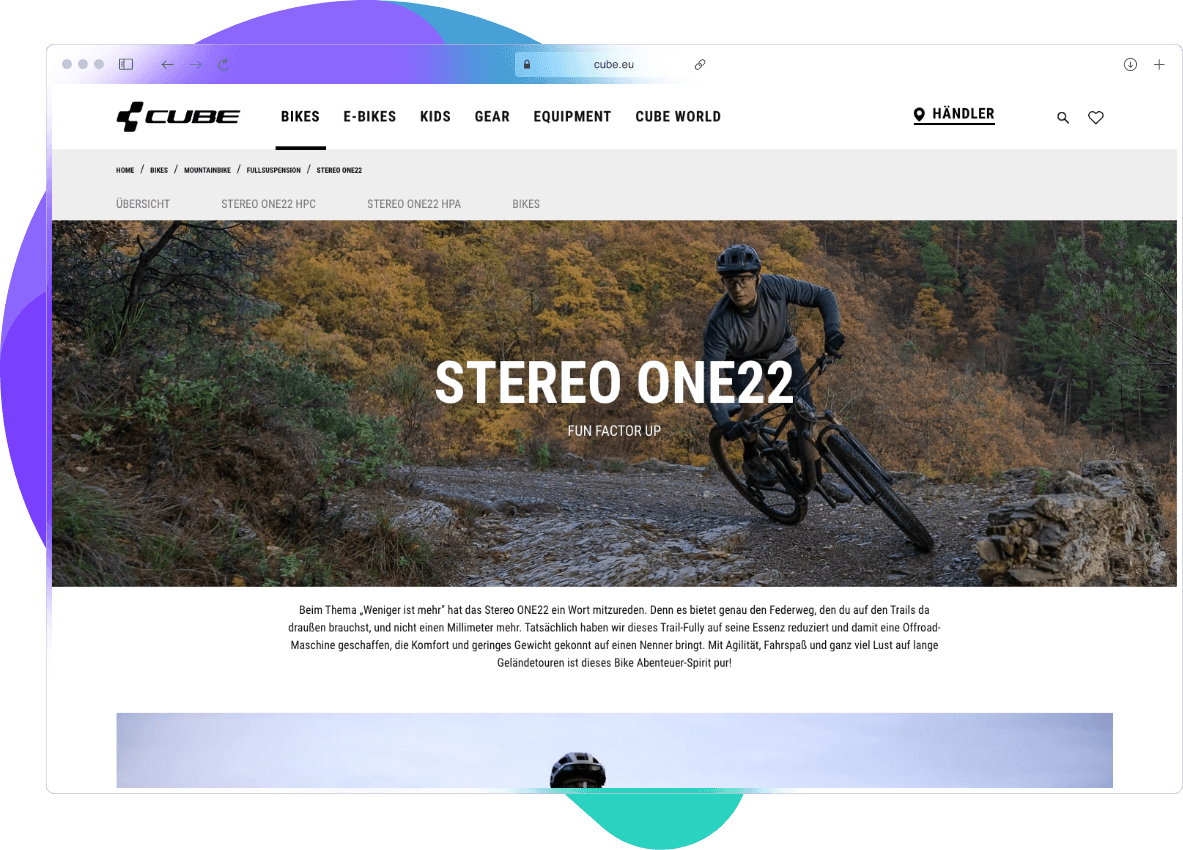Case Study

About Cube
The Cube brand was founded in 1993 in Waldershof in the Fichtelgebirge. To this day, the bicycle manufacturer is owner-managed and has always remained true to its location in the Upper Palatinate despite its steadily growing international success in now over 60 countries.
The company’s product range is extremely broad. Currently, it includes almost all bike and e-bike product types as well as an extensive collection in the areas of clothing and accessories. With more than 4,000 bikes produced per day, Cube brings more than 1 million bikes a year to retailers worldwide.
* (Numbers 01.07.2021 – 30.06.2022)

Challenge
Navigating the stream of growth
Steady expansion of the product range, increase in incoming orders, increase in the number of employees, in short: continuous growth. Sounds like every company’s dream, doesn’t it? Yes and no. Besides the many positive effects, growth also means new challenges, especially for e-commerce. Above all, setting up and maintaining an optimized data strategy is a key task. Large volumes of data not only have to be processed, but also ideally coordinated to ensure efficient processes.
The search for the perfect interface solution
For this reason, Cube also asked for a flexible interface solution to link the many data from the various internal data sources – especially the merchandise management system – with the new Shopware 6 online catalog. Due to the desire for flexibility, the choice finally fell on the iPaaS data integration platform synQup, which was to realize the project in cooperation with the Platinum integration partner elio.
Solution
Data integration with synQup
synQup is an iPaaS e-commerce data integration framework for networking different applications of complex IT system landscapes. As a holistic, flexible and scalable interface solution, synQup replaces individual interfaces between systems and brings together all data streams in a single central data integration platform.
Consistent and automated data exchange
The middleware transforms a wide variety of data types from different data sources into the desired formats, resulting in consistent and automated data exchange. Specifically, synQup can be used to transfer all data such as product, category and customer data uni- and bidirectionally between existing applications such as PIM, ERP, CMS, CRM and store systems.
Optimal data integrity and business process optimization through synQup
As a central data hub, synQup digitizes, synchronizes, integrates and automates the existing data and thus ensures optimal data integrity – the basis for efficient e-commerce. By networking and optimally exchanging data between the relevant applications, synQup makes a strong contribution to optimizing its customers’ business processes. For Cube, synQup thus represented the ideal partner.
The collaboration of synQup, elio and Cube
While elio was tasked with setting up the new Shopware 6 e-catalog for Cube, synQup was responsible for networking it with the existing peripheral systems. For this purpose, Cube developed its own API in parallel in order to be able to act even more flexibly in its processes. synQup thus had to react agilely and dynamically to changes in the two subprojects “e-catalog development” and “API development” throughout the entire project and ensure that all projects were advanced in a harmonized manner.
Specific project requirements
In January 2022, after various preliminary discussions, the project started with a planning and workshop phase. First, Cube defined the basic requirements they had for the synQup interface. These were extremely specific and individual – many cases deviated greatly from the Shopware standard, generating some custom entities. Thanks to its technical know-how and flexibility, the synQup team mastered this challenge in the best possible way and successfully implemented the customer’s wishes.
Result
A win-win-win situation for all involved
The Shopware 6-based e-catalog went live in September 2022 – to the complete satisfaction of all parties. While Cube now benefits from efficient data management between the e-catalog and other internal systems through the use of synQup, the very specific data transfer requirements on the part of Cube have led to some optimization and core enhancements at synQup itself. This also resulted in new features for elio as an integration partner, which could be used directly in other projects.
Efficient data management and individual functions for Cube
Concrete benefits for Cube include further developments by synQup in addition to the successful API integrations. For example, a special function for product launches was created, which contributes to efficient product releases by setting up a preview system so that Cube products can be maintained and checked in advance before they are available in the e-catalog. The individual developments mentioned above include special logics such as splitting a product record with different size information into up to three separate products or compiling product properties from different sources. The implementation of cross-selling information, the optimization of image management, the implementation of multi-cache locking as well as general performance and flow optimizations were also successfully realized by synQup in the course of the project.
Long term cooperation
Ultimately, Cube also benefits in the long term through the use of synQup, as the modular structure of the middleware means that additional extensions can be added to the system at any time in the future. Thus, synQup will continue to support Cube Bikes in its expansion into digitization and business automation and grow together with the company’s e-commerce developments.